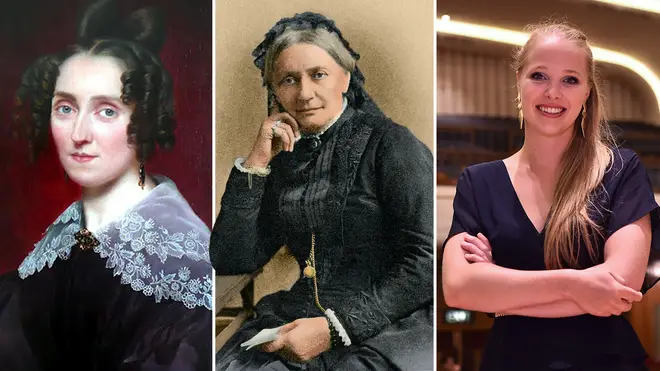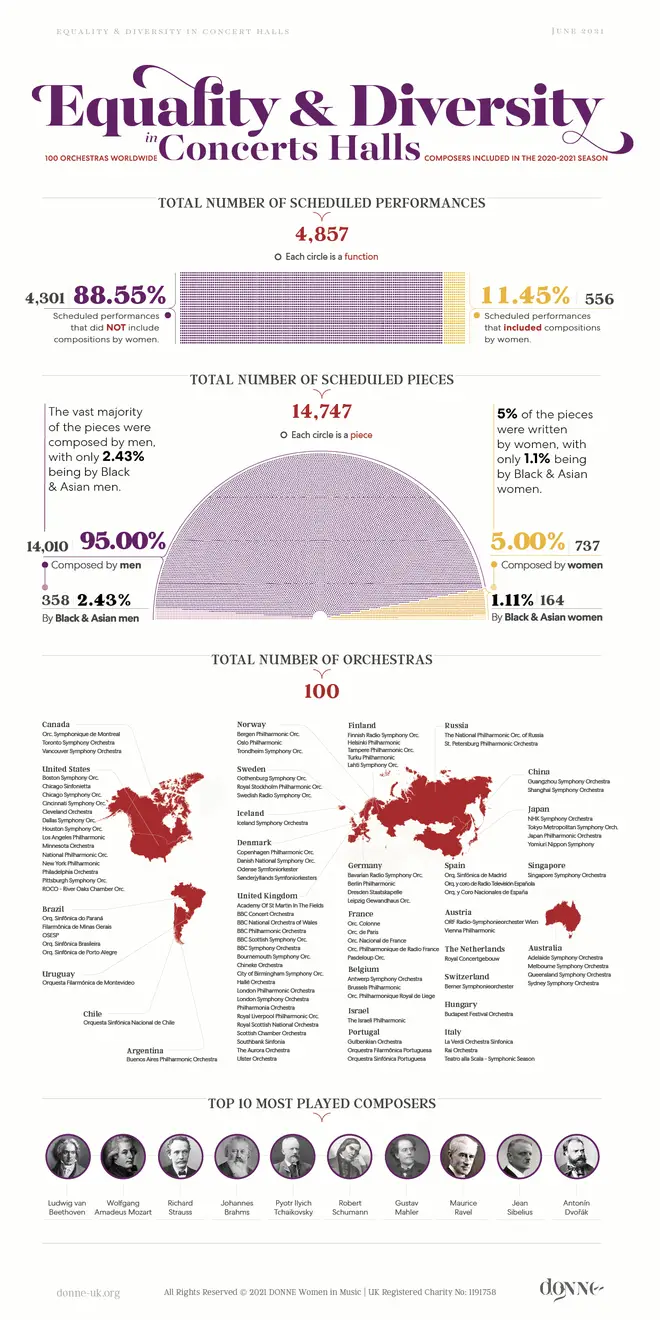On Air Now
Relaxing Evenings with Zeb Soanes 7pm - 10pm
9 September 2021, 12:26 | Updated: 10 September 2021, 13:05

An in-depth study of 100 of the world’s top orchestras’ 2020-21 seasons has revealed a staggering level of gender and racial inequality.
A new study looking at the world’s top orchestras has found that only five percent of the music scheduled in their concerts is composed by women.
And as well as 95 percent of the pieces being written by these composers’ male counterparts, a staggering 88 percent of concerts feature only music written by men.
The study, which was conducted by Donne Foundation, also examined the representation of Black and Asian composers.
The results there are stark too: just over one percent of the pieces programmed are composed by Black & Asian women, and just over two percent are by Black and Asian men.
Read more: Explore the world’s forgotten women composers in this incredible interactive map

The 100 orchestras examined include leading British orchestras like the City of Birmingham Symphony Orchestra, London Symphony Orchestra, the Hallé and Chineke! Orchestra, as well as European orchestras like the Berlin Philharmonic and Leipzig Gewandhaus Orchestra, and major US, South America and Asia-Pacific orchestras.
A total of 4,857 events scheduled by orchestras were accounted for, and 4,301 of them didn’t represent female composers at all (over 88 percent). The analysis took in 14,747 compositions in total, and 747 are by women (only five percent).
The top 10 composers programmed were Beethoven, Mozart, Richard Strauss, Brahms, Tchaikovsky, Schumann, Mahler, Ravel, Sibelius and Dvořák – all men, all white, all European, and all long-deceased.
Read more: 10 women who changed the classical music world forever

Chineke! Orchestra plays Florence Price Symphony No. 1 in E minor
Composers, musicians and arts leaders contributed to the study by outlining why diversity is so important in classical music.
Author and public speaker, Dr Kadiatu Kanneh-Mason said, “If we want the music industry to thrive, to retain and to grow its audiences, we need to ensure that those who produce, create and perform music represent the diversity of our communities.
“Equality of access, where music-learning and participation is open to everyone, regardless of background, generates energy and passion, and allows the music we love to continue its importance and vitality in our society.”
Read more: Inspiring women of Edinburgh International Festival share hopes for classical music

Live Music Month: Isata Kanneh-Mason performs Clara Schumann’s Piano Sonata (III)
Chief exec of the Royal Philharmonic Society, James Murphy, said, “Music can enliven and empower us all. But people are less inclined to engage with it if they don’t see themselves in it. That risks marginalising and diminishing something that ought to be universally cherished.
He added: “History’s done a brilliant job of making us think classical music is white and male. It’s not.”
The results around Black and Asian representation are especially striking when you consider that one of the orchestras in the study is Chineke! Orchestra, which as well as being an orchestra of majority Black and ethnically diverse musicians, works hard to ensure its programming has a majority of Black and Asian composers. You can’t help but wonder how much of the percentage of ethnically diverse composers found in this study, then, was pretty much filled by Chineke!’s dedication alone.
Donne Foundation is a UK charity that works to highlight and redress gender inequality within the music industry and beyond.
“Next time someone tells you that inequality in music is a problem of the past,” the writer of the study and founder of Donne Foundation, soprano Gabriella Di Laccio, cautions, “don’t trust what you think you know. Check the numbers instead.”
Click here to read the Donne Foundation’s study in full.